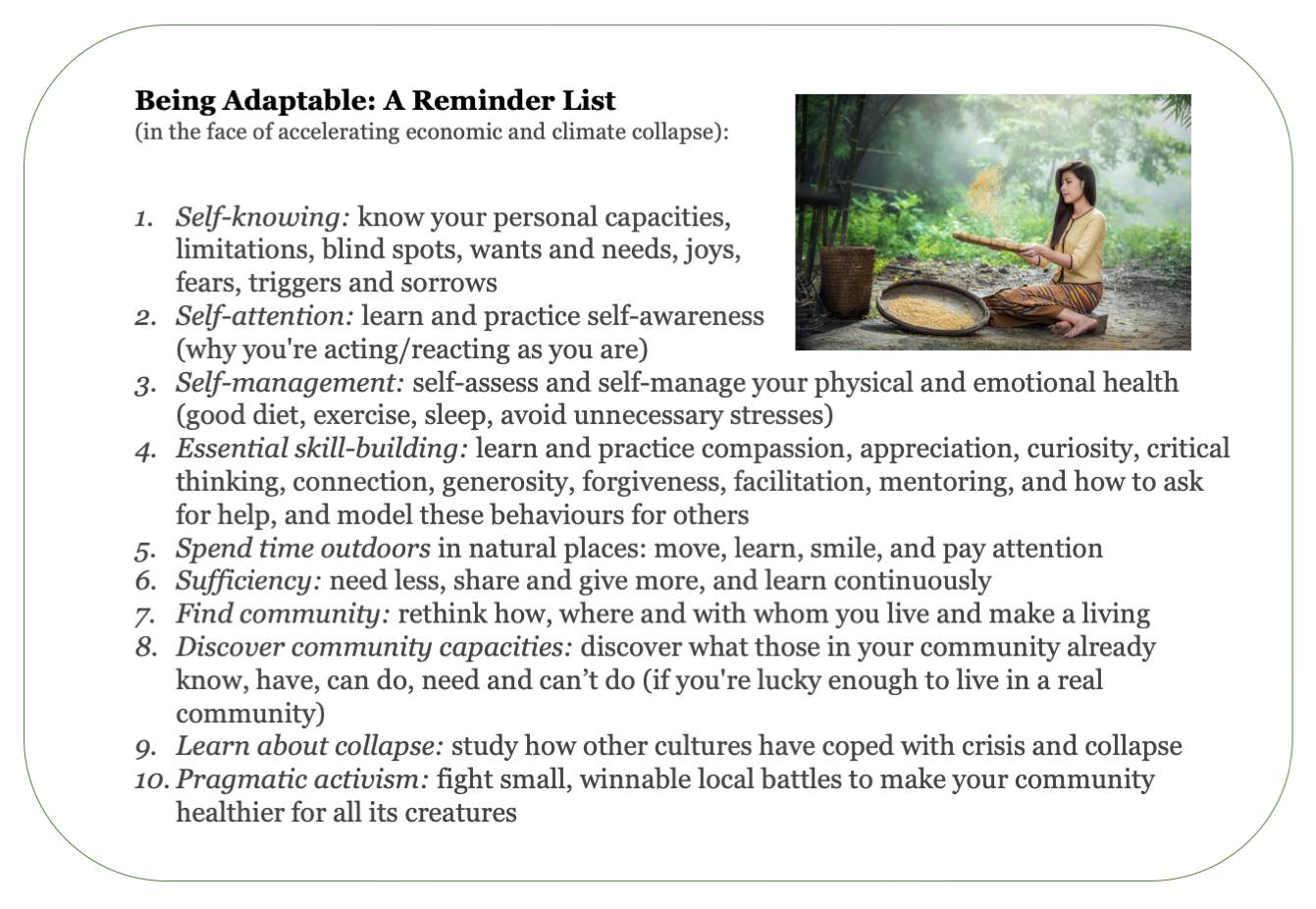
image from PXHERE, CC0
It’s been about four years since I produced an updated version of my rather complicated Community-Based Resilience Framework. The revisions I made then had already begun to acknowledge how little we can actually do to prepare ourselves and our communities for the ongoing collapse of our global industrial economy and our stable climate, ie for global civilizational collapse. No one controls this massively overextended, rapacious and immiserating economy which has critically and irrevocably disrupted and destabilized our climate, and no human endeavour can hope to understand, let alone re-stabilize, anything as staggeringly complex as our billion-year-old, ever-evolving, and astonishingly fragile climate ecology.
The Framework I produced in 2015 tried to have it both ways — it acknowledged our lack of free will, yet prescribed what we might somehow be able to (will ourselves to) do to prepare for collapse. So I thought it might be time to produce a more modest and less conflicted version of the Framework.
This time, I decided, I needed to start with an honest assessment of what is actually happening when informed, curious, intelligent people stand back and assess where we stand (personally, in our particular communities, and globally), and what is the trajectory we are anticipating. We can’t of course know what the future holds, but a study of history (our climate’s history, not just the history of our recently-arrived species), of cultures, and of economics might give us some scenarios and some inevitabilities.
So without trying to defend them (which would require a much longer article than this), here’s what I think is almost indisputably in the cards:
- The greatest impacts of economic collapse are almost sure to precede the greatest impacts of climate collapse, at least on a global scale. Both collapses are well underway and gathering momentum but are still in the early stages of visible acceleration. A complete and (for all intents and purposes) permanent global economic collapse means, ‘gradually’ over the next 2-3 decades, the end of affordable energy (ie the end of electricity, motorized vehicles, and reliable forms of heating and cooling), the end of markets, currencies, capital, savings, credit, corporations, and trade beyond the local area, and the end of all technologies that depend on affordable energy (including telecommunications, mass media, and the internet). This will occur in fits and starts, in some areas faster and more deeply than others, but it will in the end be global and total. We will have to re-learn to live locally without almost every technology on which we now depend. We’ll have time to do that, though not nearly enough time for our liking.
- The first large-scale climate collapse impacts will be related to heat, drought and soil exhaustion. These alone will likely create, with no functioning prosthetic technologies left to cool or irrigate vast areas of the planet, two billion or more ‘climate refugees’, mostly moving north, exacerbating the struggles of those already there trying to re-learn how to live locally without significant technologies. This situation will be compounding by devastating storms of many kinds and perhaps an order of magnitude more powerful, frequent and extensive than what we have ever experienced. These will render many parts of the planet, including many large cities, permanently uninhabitable. On top of that, many other parts of the world that are dependent on expensive or scarce technologies for heat, transportation, flood protection, or imported food will have to be abandoned.
So, given that we can’t really (and it’s not our nature to) prepare for such eventualities until they are imminent, what might it be possible to do now that would be of any value? And if we indeed have no free will (and I won’t argue that again here), perhaps we should instead ask what those with a proclivity to be curious, to learn new things, to be subsistent, and to live and work collaboratively with others in real community (the way all un-industrial, ‘un-civilized’ people have seemingly always lived and thrived), will likely be doing that will make them uniquely able to adapt to what is to come?
I’m going to start with the list of 25 things to do from my 2015 Framework, and cross off or amend those that I now think, hubris aside, are impracticable or unrealistic, at least in the immediate future:
Know Ourselves:
- know your personal capacities, limitations, blind spots, wants and needs, joys, fears, triggers and sorrows
- learn and practice self-awareness (why you’re acting/reacting as you are)
discover where we belong and what we’re meant to do
Heal and Love Ourselves and Others:
- self-assess and self-manage your physical and emotional health (good diet, exercise, sleep, avoid unnecessary stresses)
- learn and practice compassion, appreciation, curiosity, critical thinking, connection, gratitude, generosity, forgiveness, facilitation, mentoring, and how to ask for help, and model these behaviours for others
- spend time outdoors in natural places (learn, move, smile and pay attention)
| appreciate our true nature | insist on joy in spite of everything learn new ways to heal and help others heallove unreservedly, even those we don’t like
Liberate Ourselves from Dependence on Centralized Industrial Systems:
- need less, share and give more, and learn continuously
strive to realize the illusion of self, ego, control, separateness & timeself-assess and increase personal independence from centralized systemshelp liberate others by modelling equanimity, presence etc.engage with the fearful and with deniers
Rethink, Shift and Experiment:
- Find community: rethink how, where and with whom you live and make a living
learn how our complex world really worksfind people who share your passions and purposeinstead of a job, find and fill real local needsshift to the sharing/gift economy
Prepare Collectively:
- discover what those in your community already know, have, can do, need and can’t do (if you’re lucky enough to live in a real community)
- study how other cultures have coped with crisis and collapse*
- fight small, winnable local battles to make your community healthier for all its creatures
learn what you need and don’t need to live full, joyful livesassess and build your community’s self-sufficiency, resilience and mobilitysource locally | build collective community capacityrehearse crisis response in your community
This leaves us with just ten things to do instead of 25, and they’re practical things we can do even while the existing industrial systems still work (and our dependence on them, for perfectly human reasons, remains). We can’t jump the gun; we have to continue to work mostly within the existing systems that we and all around us continue to support and depend on, until they crumble, which will likely be sooner than you’d think.
With just ten items on this Being Adaptable list (I’m no longer going to use the word “preparing”, since we can’t know what to “prepare” for; we have to be prepared for anything), we can now dispense with the categories, so the list, in order from most inward-facing and personal to most outward-facing and communitarian, looks like this (click on the image to download a larger version if you want to print it):

My guess is that you’re probably already doing most or all of these things, or at least they would not be a big stretch for you. To me that’s the hallmark of a good, practical list. Even if I did believe we have free will, I would still believe we are, mostly, doing what we’re doing for a perfectly valid reason. And I believe we’re all doing our best (even if some of us are ignorant and misguided). So this is now more a list of reminders than a “to do” list. And when you do these things, naturally, others will see and learn from you, and reciprocate. That’s our nature too.
* hint: mostly they just walked away and found others with whom to live more simply; violent ‘Mad Max’ type scenarios have been uncommon





This is great, Dave!
Just read it aloud to my beloved, Connie, and we both love your shorter list and look forward to discussing this (and related topics) on a “Post-Doom Conversations” call in a week or two. Bravo!
Big cyberhug,
~ Michael
It’s too bad that most current “adaptation” involves covering the world with more and bigger machines, notably industrial wind turbines. “Clean energy” is fast becoming the biggest blight on the planet, all for a pittance of true CO2-reduction.
https://falseprogress.home.blog/2016/08/29/windturbineslandscapes/
And now, with huge Internet satellite networks underway from SpaceX, Amazon and OneWeb, nothing is really safe from urban sprawl. Any open space not already protected seems up for grabs, and population growth adds to the pressure.
Nature’s growing susceptibility to man-made damage concerns me more than whether pockets of humans will adapt, which they undoubtedly will, short of a nuclear winter.